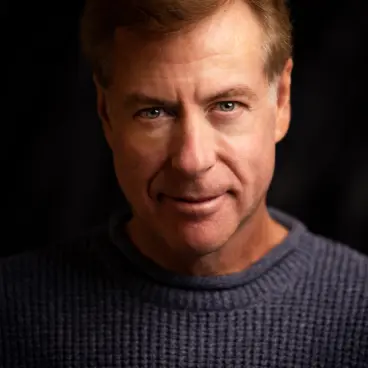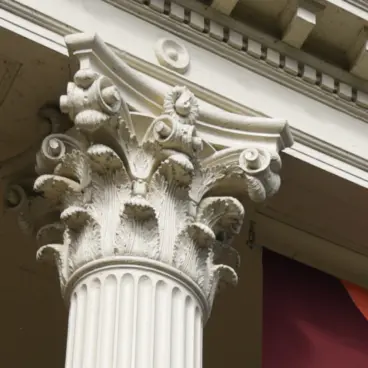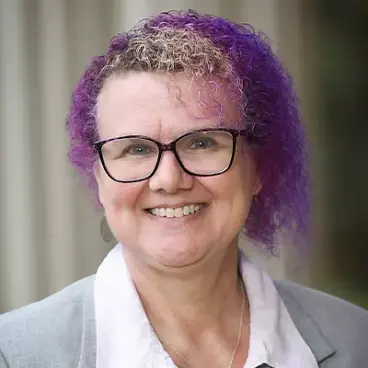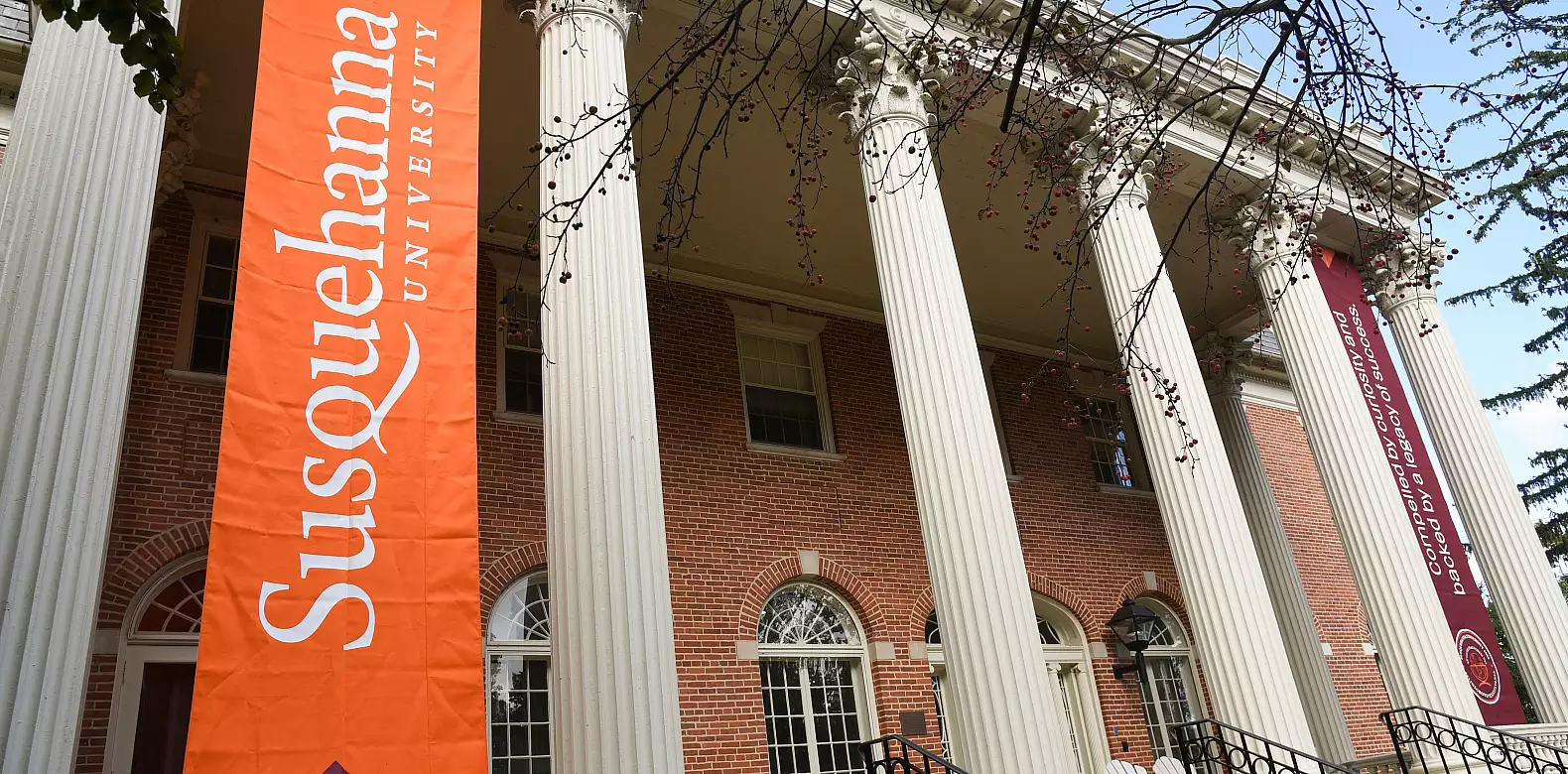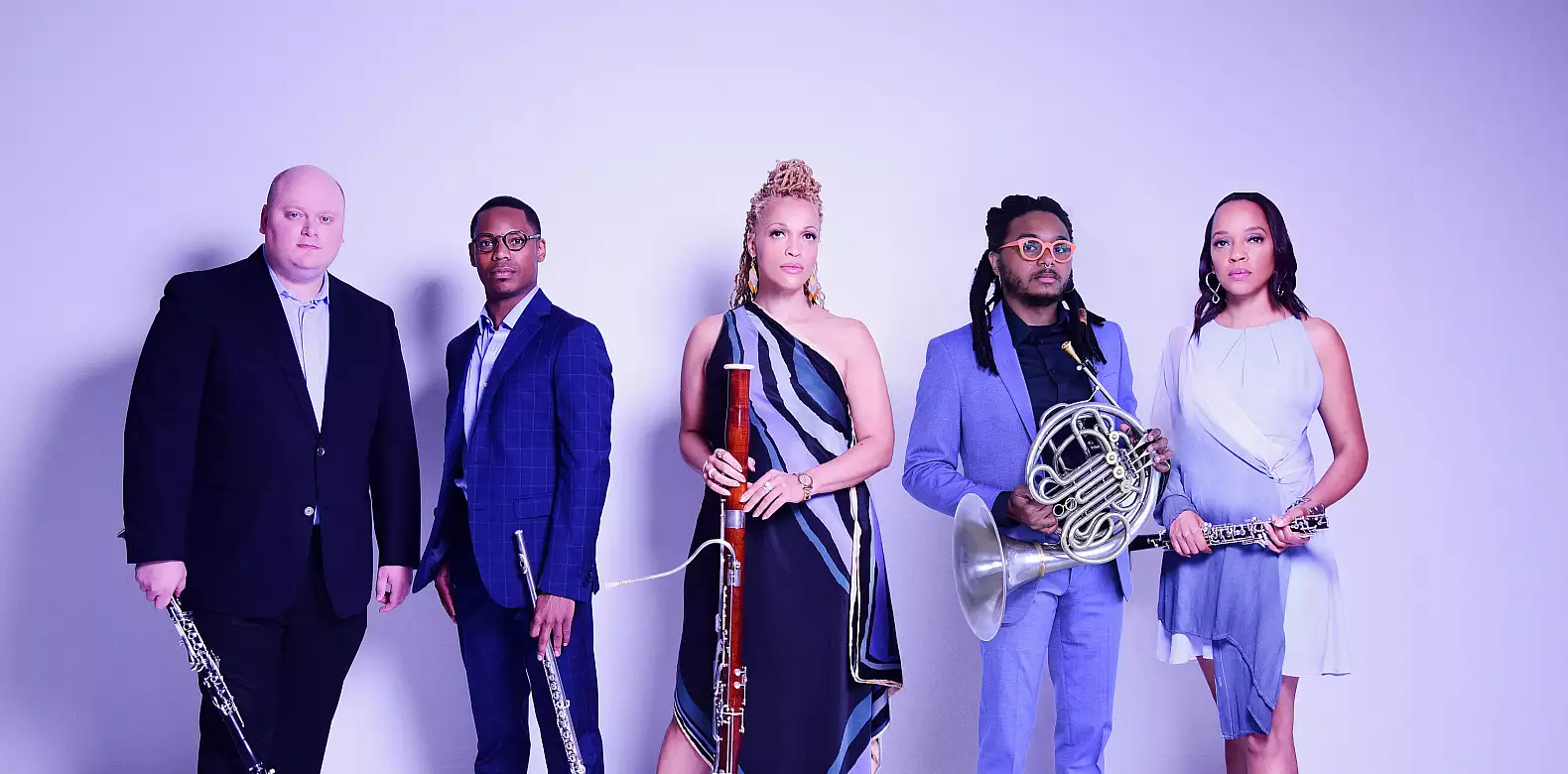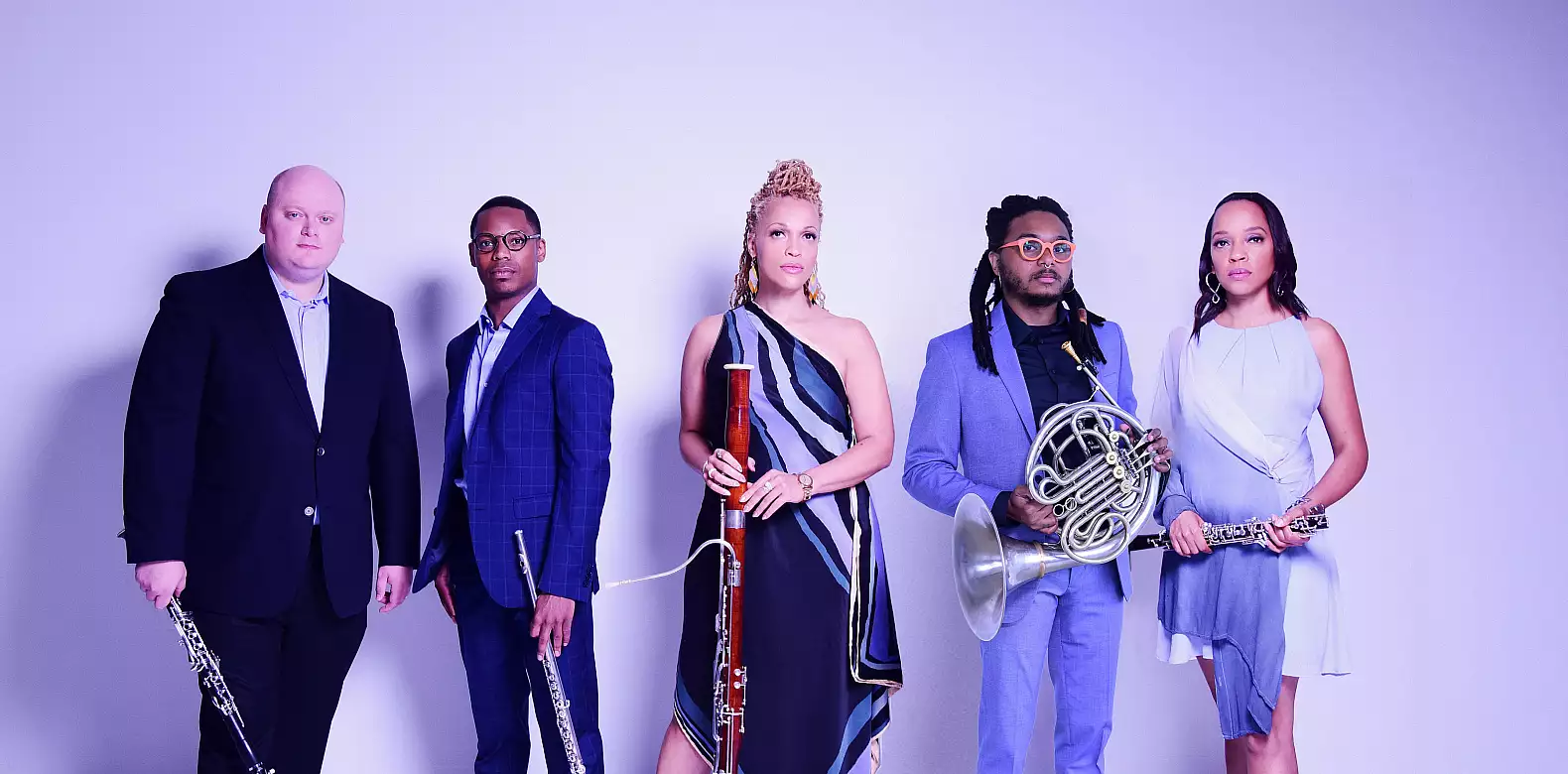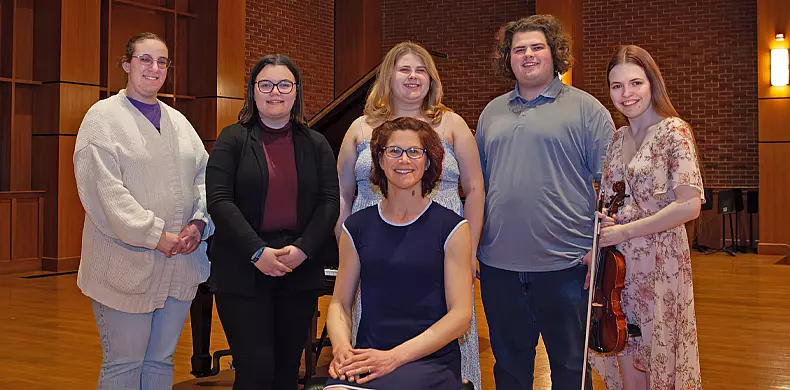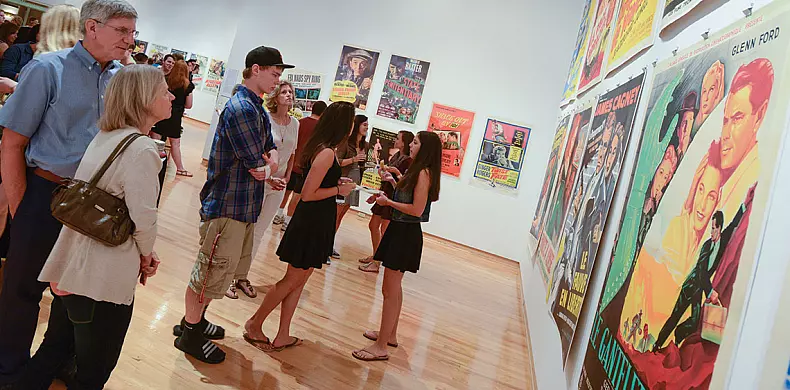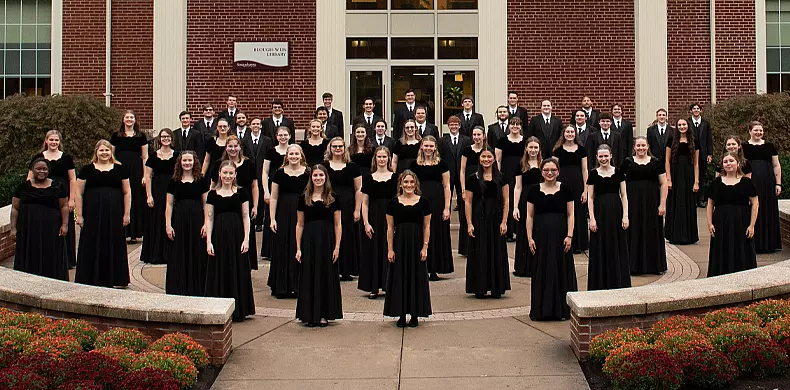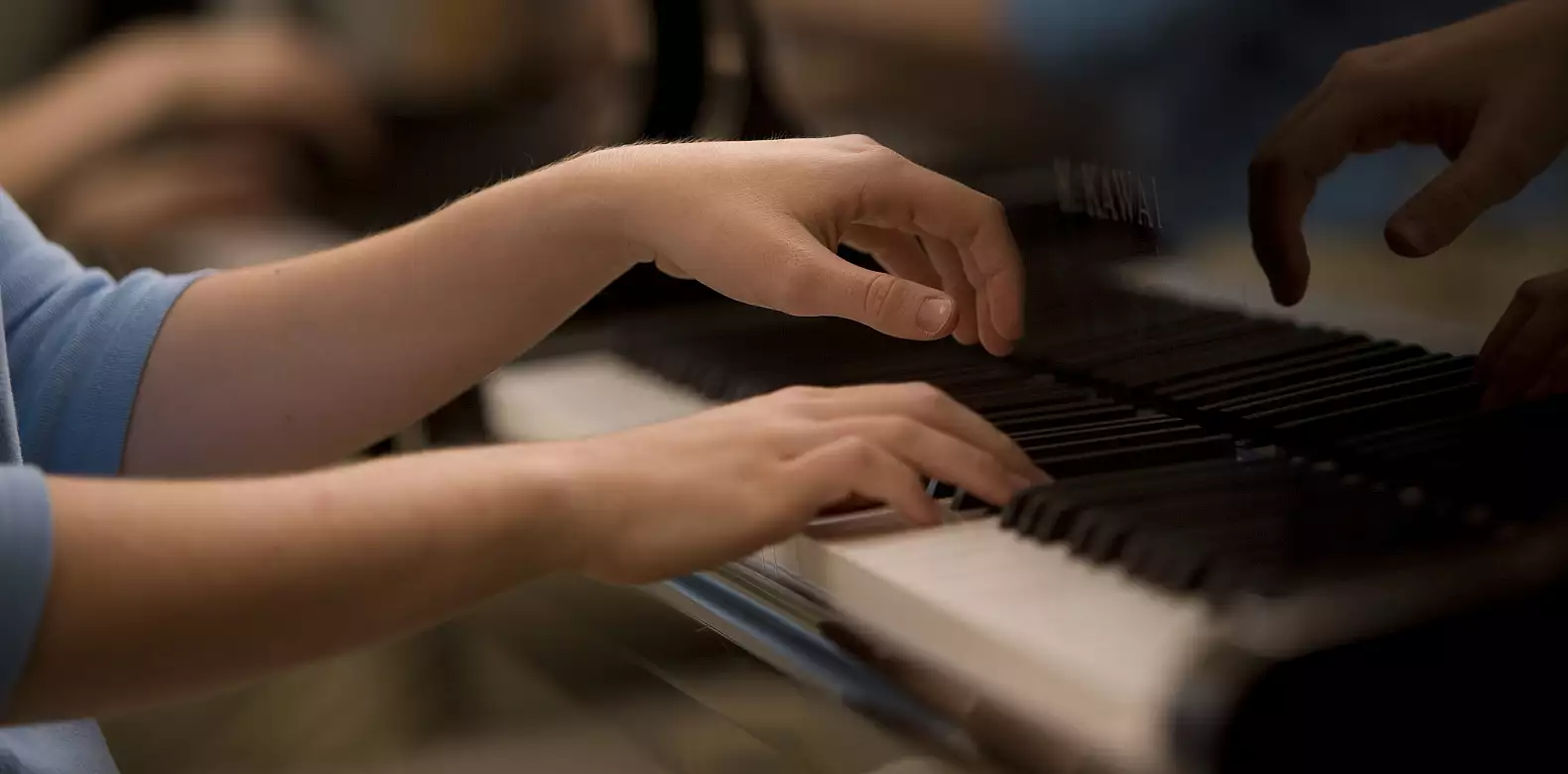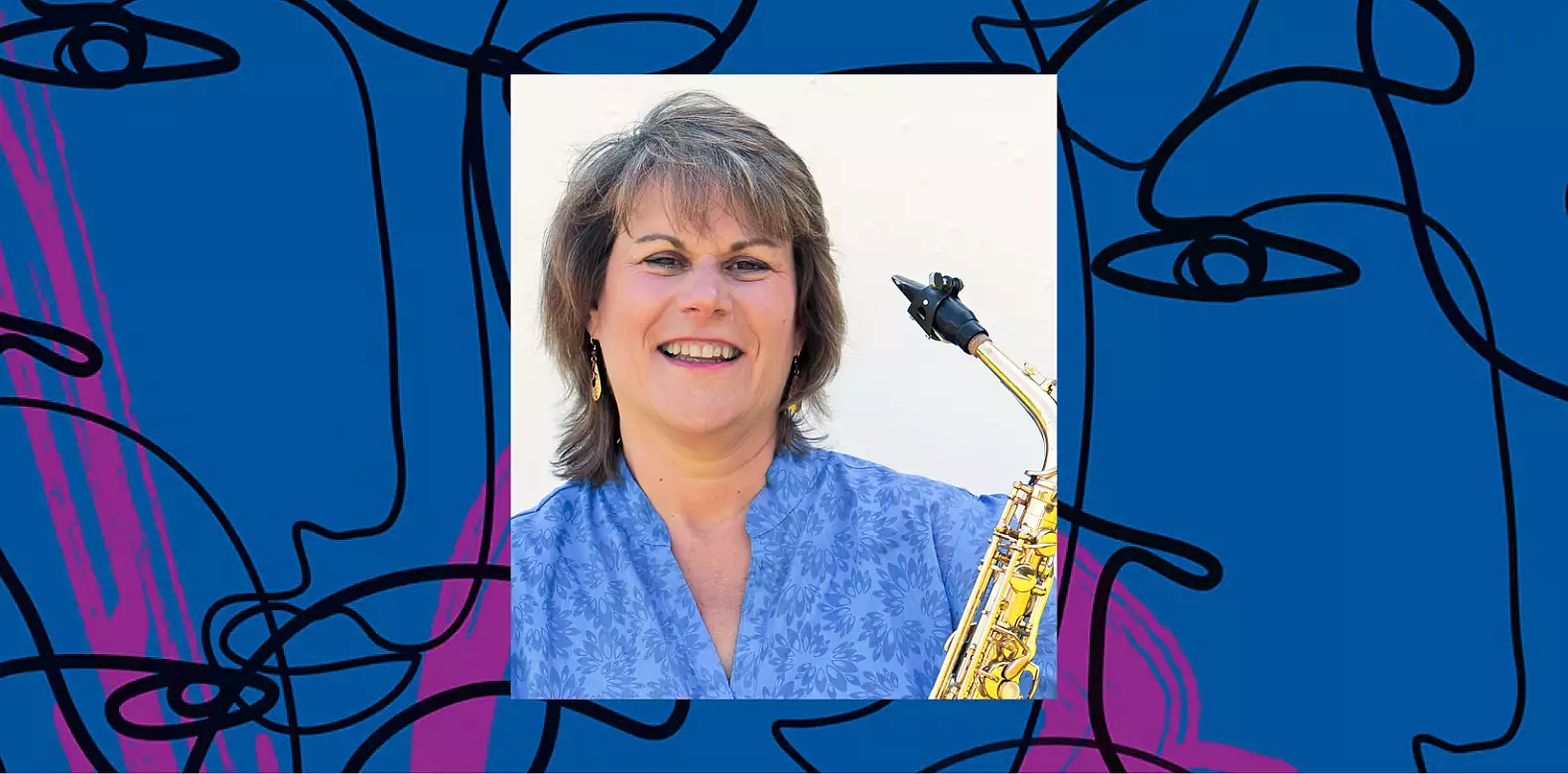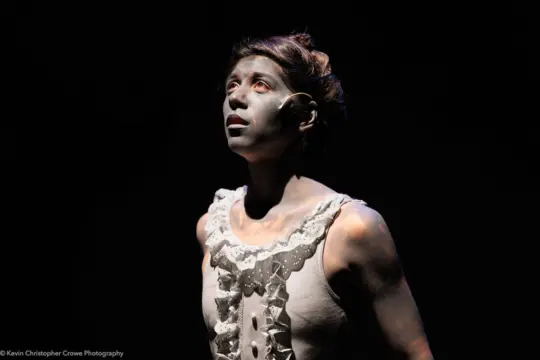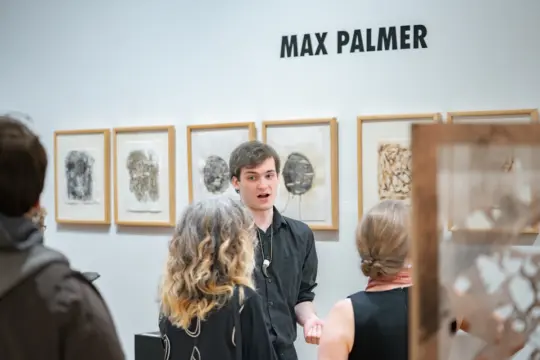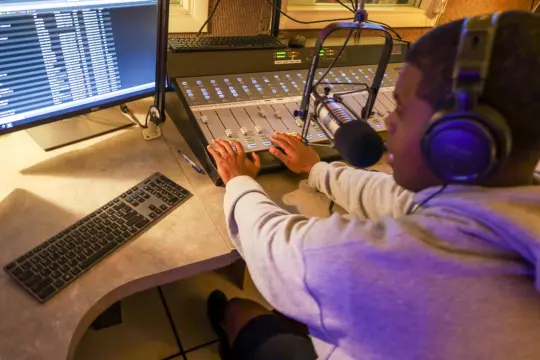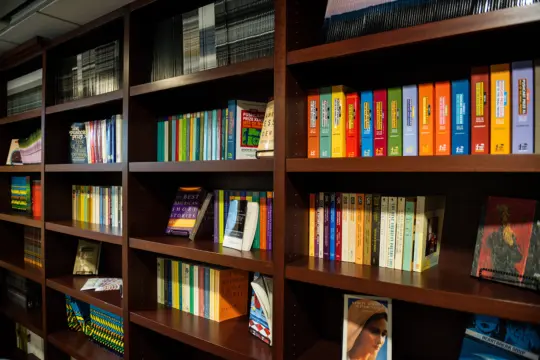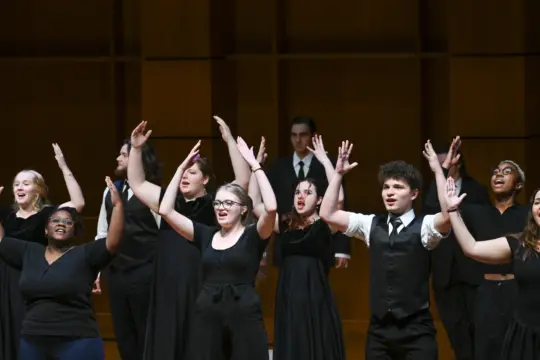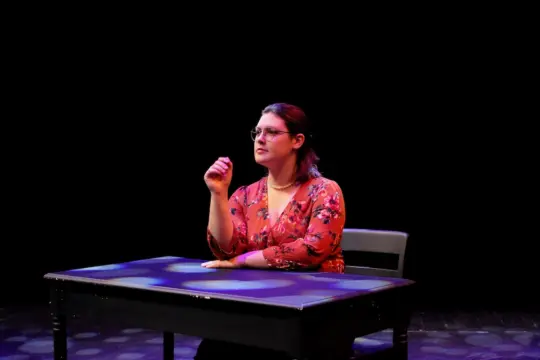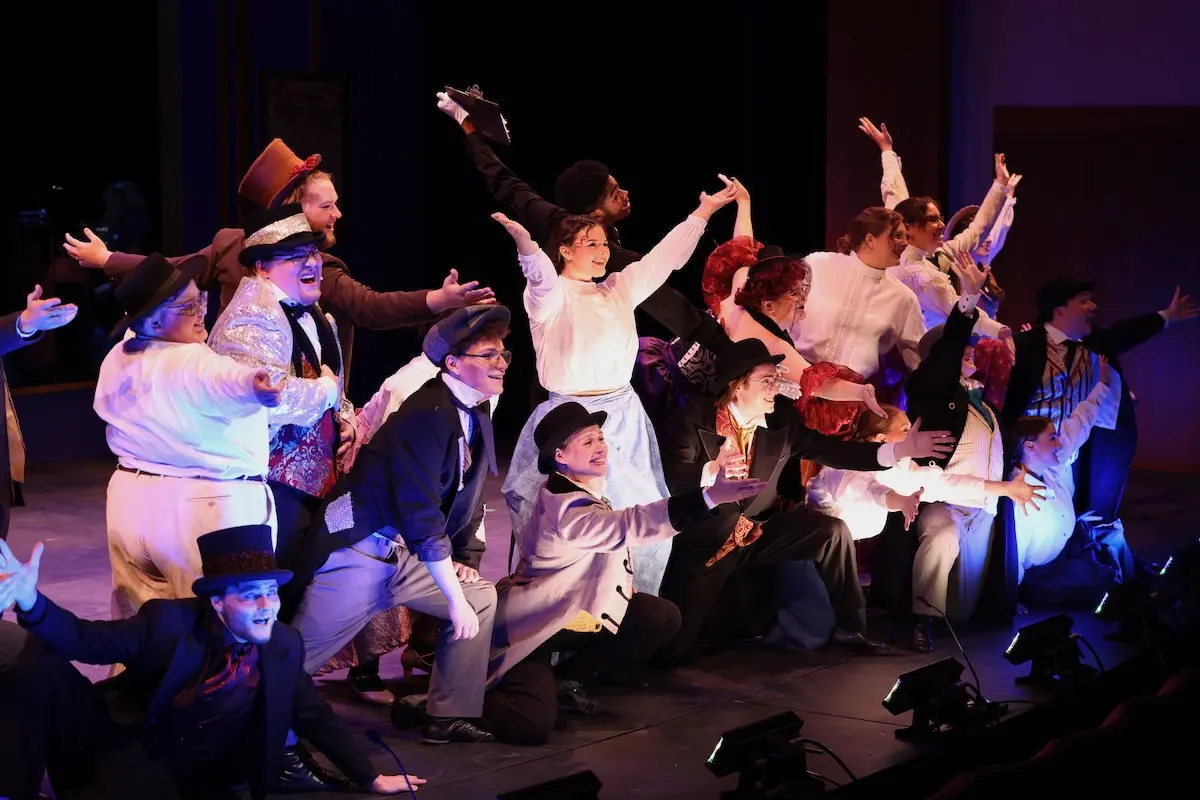
Theatre B.A. Degree
Susquehanna University’s Bachelor of Arts theatre degree allows you to receive professional-quality training in a liberal arts setting. With areas of focus in production & design, theatre performance or theatre studies, the program is designed to be flexible, allowing you to explore your creativity while pursuing a second major or minor that broadens career options.
From your first semester, you’ll engage in productions that immerse you in the world of theatre, whether you’re on stage or behind the scenes. You’ll work with experienced faculty and active theatre professionals who will guide you through the artistic and business sides of the industry. The program’s comprehensive approach ensures you develop not only technical skills but also valuable, transferable abilities such as communication, problem-solving and collaboration.
Should you decide to focus more intensely on your craft, transitioning into Susquehanna’s Bachelor of Fine Arts (BFA) program is a seamless process.
Susquehanna’s theatre program stages five major performances and several smaller productions annually.
discover the theatre Program at susquehanna university
Whether your passion is on stage or behind the scenes, Susquehanna University’s degrees offer the training and mentorship you need to succeed in your future career.
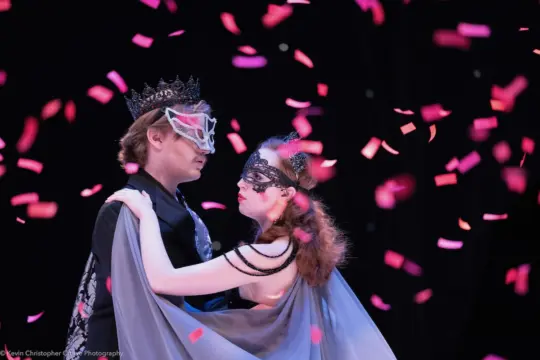
SU By the Numbers
More Than Metrics
75%
of theatre students attend a conference with theatre faculty before graduation
100%
of theatre students who applied to graduate school were accepted
100%
of theatre students are cast or participate in a faculty-led production their first year
Which theatre degree should I choose?
Explore your passion for the performing arts with a range of degree options tailored to different career paths. Each program offers unique opportunities to develop your skills and achieve your professional goals in theatre.
The Bachelor of Fine Arts (BFA) in acting at Susquehanna University provides intensive, focused training designed to make students competitive in the professional acting world. This program is for driven individuals dedicated to mastering the craft of acting. Learn more by clicking the link below.
Majoring in theatre with an emphasis in performance offers professional-quality theatre training within a liberal arts setting, allowing students to explore acting while pursuing a second major or minor. It’s ideal for those who want a well-rounded education with a strong emphasis on performance. Learn more by clicking the link below.
Majoring in theatre with an emphasis in production & design combines hands-on experience in technical theatre with a flexible, interdisciplinary liberal arts education. Students gain practical skills in scenic design and lighting while having the option to double major or add a minor. Learn more by clicking the link below.
The Bachelor of Fine Arts (BFA) in theatre management is a highly-specialized degree that prepares students to lead and manage theatre operations. It offers deep interdisciplinary training in collaboration with the Sigmund Weis School of Business, perfect for those aiming to run a theatre. Learn more by clicking the link below.
Majoring in theatre with an emphasis in theatre studies provides a broad, research-focused education in theatre, perfect for students interested in the historical and scholarly aspects of the discipline. This program offers flexibility for double majors and prepares students for diverse career paths or graduate study. Learn more by clicking the link below.
Explore Your Studies
Program Resources
An ensemble of singers, dancers, and actors that rehearses and performs a fully-realized musical theatre production. Prerequisite: Instructor’s permission, by audition. 1 SH.
An ensemble led by a student director that rehearses and performs a full-length production in the spring semester. Prerequisite: department permission, by audition. 1 SH. CC: Team Intensive.
A large ensemble of performers that rehearses and performs a full-realized, challenging piece of dramatic literature in the spring semester. Prerequisite: instructor’s permission, by audition. 1 SH. CC: Team Intensive.
A small ensemble of highly select performers who rehearse and perform a fully-realized, challenging piece of dramatic literature in the fall semester. Prerequisites: instructor’s permission, by audition. 1 SH.
This ensemble course will challenge students with demanding roles in a bare-bones acting environment to bring out their best talent in a no-frills, cutting edge performance experience. Prerequisites: instructor’s permission, by audition. 1 SH.
Students explore production process, management and leadership skills preparing scenery, properties, special effects, sound and costumes for university theatre productions. The course offers hands-on training, exploring practical applications of artistic and structural design, project management, team development, construction techniques, and resource coordination. Expectations are eight hours of lab each week with possible evening rehearsal and performance assignments. 4 SH. CC: Team Intensive.
Students explore the production process for executing theatrical designs for university theatre productions. This course focuses on scenic painting techniques and the installation and operation of theatre lighting equipment. Hands-on training. Expectations are up to eight hours of lab each week with possible evening rehearsal and performance assignments. 4 SH. CC: Team Intensive.
Students explore the production process for executing costume designs for university theatre productions. The model of a professional costume shop and its personnel is used in order to provide hands-on training in costume construction, costume shop operations, team building and organization, analyzing, and problem-solving. The course focuses on the practice of basic skills in costume production, repair, and maintenance all within a collaborative atmosphere. 4 SH.
This course explores a broad spectrum of skills in the creative process of acting. These skills (including expansion of vocal and physical abilities, emotional and sensory awareness, improvisational skills, etc.) will be focused toward introducing the prospective actor to the six basic steps in Stanislavski’s “System of Acting.” Prerequisite: Theatre major, theatre minor, or department’s permission. 4 SH.
This course is an overview and examination of the basic principles and elements of design and how they are related to and used in scenic, costume, and lighting design for theatre. Topics will include the design process, research methods, and practical considerations for executing designs. 4 SH
An introduction to world dramatic literature through study of the development of drama and its various forms with a focus on dramatic movements and theatrical innovations, as well as the cultural aesthetic, literary, and political contexts of individual works. 4 SH. CC: Literary Expression, Diversity Intensive.
Through the reading and analysis of various genres of play texts written by a diverse collection of playwrights, this course analyzes theatre’s unique ability to engage with both the agenda and the trauma of violence. Students in this course will learn to consider violence as a tool of oppression that reinforces power structures and as an expression of trauma by those un-empowered by the same societal power structures. Same as WGST-241. 4 SH. CC: Diversity Intensive, Ethics Intensive.
Portfolio projects in costume design beginning with script analysis and research and culminating with finished renderings and realized design components for the student’s portfolio. 4 SH.
THEA-245 Scenic and Lighting Design. This course will explore scenic and lighting design and the responsibilities of the scenic and lighting designer in the production process. Students will be introduced to the art and practice of advanced design through practical projects in script analysis, literary research, technical drawing, rendering and modeling. Prerequisite: THEA-160 Theatrical Design Fundamentals. 4 SH.
An in-depth exploration of the basic principles of acting and the creative process introduced in Acting I. These skills (including expansion of improvisational skills, action and text analysis, character analysis and transformation, communion, etc.) will be focused toward advanced work in scene and monologue study, specifically dealing with early and contemporary realism. Prerequisite: Sophomore standing and THEA-151. 4 SH.
Historical survey from the fifth century B.C.E. to the mid-19th century and the rise of realism, studying the theatre and drama of Europe and its colonies, including (but not limited to) Canada, the United States and Mexico. Integrates the study of the history of the theatre through representative plays and their production. Students view live performances, tapes and films to gain an on-stage perspective. Field trips involved with some costs; waiver possible. CC: Artistic Expression. 4 SH.
Survey of the indigenous and postcolonial theatre and drama of Asia, Africa, the Middle East and the Americas, among others. Integrates the study of the history of the theatre through representative plays and their production. Students view live performances, tapes and films to gain an on-stage perspective. Field trips involved with some costs; waiver possible. 4 SH. CC: Artistic Expression, Diversity.
This course surveys the history of African American theatre as a reflection of the African American culture and experience. The course will examine the history of African American theatre and the African American practitioner’s role in theatre from slavery to modern times. Through the study of African American dramatic literature the course examines various dramatic genres (comedy, tragedy and melodrama), historic and contemporary themes and developments in African American theatre especially the body of plays that shaped the popular image of Black life in America and in many cases perpetuated negative stereotypes of African-Americans. 4 SH. CC: Diversity. Historical Perspectives.
An exploration of dramatic literature with a concentration in play analysis. The analysis will focus on the structure of dramatic art and how it can be applied by the theatre artist. Prerequisite: THEA-151. 4 SH. CC: Writing Intensive.
Inspired by the original choreopoem by Ntozake Shange, this course introduces the choreopoem form, investigating the concept of the living text as it applies to collaboration across multiple disciplines. Using literary analysis, creative writing and theatre, students research the choreopoem form, write one as a class and publicly perform it, reflecting on the tension of intention versus impact in performance spaces. Same as WRIT-260 and AFRC-260. Sophomore or higher standing required. 4 SH. CC: Interdisciplinary, Diversity Intensive, Team Intensive.
Survey of stage management and theatre administration, exploring the relationship between the artistry of theatre as a fine arts discipline and the execution of management principles in theatre operations. Topics to be studied include stage management, theatre organization, professional unions, production management, publicity/marketing, and box office and house management. Prerequisites: Instructor’s permission and junior standing. 4 SH. CC: Interdisciplinary.
Porfolio projects in make-up design, beginning with script analysis and research and culminating with realized and conceptual projects. Projects in make-up design will expose students to the techniques of traditional, prosthetic, and wig applications. Prerequisite: Sophomore standing or instructor’s permission. 4 SH.
Advanced training in acting with an emphasis on effective vocal/rhetorical techniques and on the use of poetic rhythm and imagery in creating a role psychologically as well as physically. Definition of style/language analysis, Greek period style, the comic impulse/Commedia Dell’arte, Renaissance/Elizabethan period style, 17th-century French farce, and Restoration/Georgian “Comedy of Manners.” Prerequisites: Sophomore standing and THEA-151. 4 SH.
Study of the basic processes of play directing, script selection, blocking, rehearsal procedure, casting, directorial function, and the history of directing. Direction of in-class scenes and presentations of a single all-class scene program at the end of the term for the public. Prerequisites: THEA-151 and either THEA-252 or THEA-258, or instructor’s permission. 4 SH.
Issues and topics in theatre. Emphasizes research and analysis. Prerequisite: instructor’s permission. 4 SH.
Students will engage in a focused examination of the major literary and theoretical movements found in drama, spanning the late 19th century to the present. Prerequisites: Senior standing. 4 SH. CC: Diversity Intensive, Writing Intensive.
Applied projects in theatre design, technical production, or theatre management, completed in conjunction with Department of Theatre productions. The student and the supervising professor will determine and tailor projects to ensure both mastery of the student’s project (or assignment) and a general understanding of the complexities of theatre. All projects require departmental approval, are critically assessed by the supervising faculty member as well as the student, and must be completed to the satisfaction of the theatre faculty. Four semesters of Production Lab are required for graduation with the Production and Design emphasis of the B. A. in theatre (may be waived at the discretion of the department). 1 SH.
In-depth exploration of selected topics in theatre with faculty guidance allows students to focus on topics outside normal sequence of course offerings. Prerequisite: department-designated faculty director’s permission. May be repeated. 1-4 SH.
Independent study for candidates accepted into the departmental honors program. Candidates work under faculty direction, develop and submit a written or production thesis, and defend their thesis orally. 4 SH.
Supervised work in fields related to professional and/or not-for-profit theatre. Prerequisite: Junior or senior standing and internship coordinator’s permission. Variable credit.
The Capstone Portfolio course is a faculty-guided independent study overview of student achievement in academic work including aspects of theatre operations, design and technology, performance, dramaturgy, and research and writing. A student and a supervising faculty member will tailor portfolios to reflect a student’s individual achievements within the theatre curriculum and production work. This course is a reflective and forward-looking experience with content derived from the student’s academic experiences both in the classroom and in practice-based learning. By participating in this course students will enhance their artifacts of academic and production achievement to create and present a comprehensive portfolio of their work and career trajectory. 2 SH. Capstone.
When you enroll at Susquehanna, you’ll be paired with an advisor and application tool to guide you in your course planning and scheduling. The following is an excerpt from the complete course catalog. Enrolled students follow the requirements of the course catalog for the academic year in which they declare each major and/or minor, consult with their advisor(s).
Learning Goals
- Students will learn to articulate artistic, scholarly and production related vocabularies, methods and theories of theatrical practice in order to support their continued study and practice of theatre.
- Students will develop proficiency in script analysis, production conceptualization, the history of theatre and theatre’s importance to society.
- Students will learn how to contribute to the discipline and practice of theatre, and to society by recognizing and employing relevant and pertinent theatre and interdisciplinary sources to inform their creative and scholarly activities.
Double-counting Restriction
Students may not have a B.A. and a BFA within the department.
Major in Theatre
Requirements for the Bachelor of Arts in Theatre
Susquehanna offers a B.A. in theatre with three emphases: performance, production & design, and theatre studies. Majors complete university Central Curriculum requirements plus 52 semester hours of courses in one of the three theatre emphases. These include introductory courses and specific emphasis requirements. A grade of C- or better is required for any course to apply to the major or minor. Courses may count toward only one emphasis or minor. The department also expects theatre majors and minors to participate each semester in department theatre productions and activities supervised by department faculty.
Theatre Major Emphases
Students fulfill the university Central Curriculum requirements, participate fully in department productions and successfully complete the following courses:
Department Requirements
- 4 THEA-151 Acting Fundamentals
- 4 THEA-160 Theatrical Design Fundamentals
- 4 THEA-252 World Theatre 1
- 4 THEA-253 World Theatre 2
- 4 THEA-258 From Page to Stage
- 4 THEA-340 Stage Management and Theatre Operations
- 4 THEA-505 Capstone Portfolio
Students also choose one of the following options:
Option One: Performance Emphasis
Option Two: Production & Design Emphasis
Option Three: Theatre Studies Emphasis
Option One: Performance Emphasis
- 4 THEA-251 Acting II: Voice and Movement
- 4 THEA-351 Acting III: Period Styles
- 4 THEA-451 Directing
4 semester hours chosen from the following:
- 1 THEA-101 The Fall Musical
- 1 THEA-102 Student-directed Production
- 1 THEA-103 Acting Workshop
- 1 THEA-104 Advanced Acting Workshop
- 1 THEA-105 Experimental Acting Workshop
4 semester hours chosen from the following:
- 4 THEA-142 Stagecraft
- 4 THEA-143 Scenic Production
- 4 THEA-144 Costume Technology
4 semester hours chosen from the following:
- 1 THEA-101 The Musical
- 1 THEA-102 Student-directed Production
- 1 THEA-103 Acting Workshop
- 1 THEA-104 Advanced Acting Workshop
- 1 THEA-105 Experimental Acting Workshop
- 4 THEA-240 Theatre and Violence
- 4 THEA-241 Costume Design
- 4 THEA-245 Scenic and Lighting Design
- 4 THEA-254 Race and Identity in Theatre
- 4 THEA-342 Stage Makeup
- 4 THEA-452 Seminar in Theatre
Option Two: Production & Design Emphasis
- 4 THEA-142 Stagecraft
- 4 THEA-143 Scenic Production
- 4 THEA-501 Production Lab
8 semester hours chosen from the following:
- 4 THEA-241 Costume Design
- 4 THEA-245 Scenic and Lighting Design
- 4 THEA-342 Stage Makeup
4 semester hours chosen from the following:
- 4 THEA-144 Costume Technology
- 4 THEA-240 Theatre and Violence or THEA-254 Race and Identity in Theatre
- 4 THEA-452 Seminar in Theatre (repeatable with topic change)
Option Three: Theatre Studies Emphasis
- 4 THEA-200 Introduction to Dramatic Literature
- 4 THEA-240 Theatre and Violence
- 4 THEA-254 Race and Identity on the American Stage
- 2 THEA-502 Dramaturgy
4 semester hours chosen from the following:
- 4 THEA-200 Introduction to Dramatic Literature
- 4 THEA-240 Theatre and Violence
10 semester hours may be chosen from the courses below:
- 4 THEA-142 Stagecraft
or THEA-143 Scenic Production
or THEA-144 Costume Technology - 4 THEA-241 Costume Design or THEA-342 Stage Makeup
- 4 THEA-245 Scenic and Lighting Design
- 4 THEA-251 Acting II: Voice and Movement
- 4 THEA-260 The Choreopoem
- 4 THEA-451 Directing
- 4 THEA-452 Seminar in Theatre (repeatable once with department head approval)
- 1 THEA-502 Dramaturgy (repeatable once)
- 1 THEA-501 Production Lab (repeatable once)
No more than 4 semester hours from the following may be included:
- 1 THEA-101 The Musical
- 1 THEA-102 Student-Directed Production
- 1 THEA-103 Acting Workshop
- 1 THEA-104 Advanced Acting Workshop
- 1 THEA-105 Experimental Acting Workshop
Honor Society
Students who meet the requisite national and local standards are eligible to join Alpha Psi Omega.
When you enroll at Susquehanna, you’ll be paired with an advisor and application tool to guide you in your course planning and scheduling. The following is an excerpt from the complete course catalog. Enrolled students follow the requirements of the course catalog for the academic year in which they declare each major and/or minor and consult with their advisor(s).
Minor in Theatre
Students are expected to participate in departmental theatre productions and complete 20 semester hours:
4 Choose 4 semester hours from:
- 4 THEA-142 Stagecraft
- 4 THEA-151 Acting Fundamentals
- 4 THEA-252 World Theatre 1
- 4 THEA-253 World Theatre 2
16 Choose 16 additional semester hours from:
- 1 THEA-101 The Musical
- 1 THEA-102 Student-Directed Production
- 1 THEA-103 Acting Workshop
- 1 THEA-104 Advanced Acting Workshop
- 4 THEA-142 Stagecraft
- 4 THEA-143 Scenic Production
- 4 THEA-144 Costume Technology
- 4 THEA-151 Acting Fundamentals
- 4 THEA-160 Theatrical Design Fundamentals
- 4 THEA-240 Theatre and Violence
- 4 THEA-241 Costume Design
- 4 THEA-245 Scenic and Lighting Design
- 4 THEA-251 Acting II: Voice & Movement
- 4 THEA-252 World Theatre 1
- 4 THEA-253 World Theatre 2
- 4 THEA-258 From Page to Stage
- 4 THEA-340 Stage Management & Theatre Ops
- 4 THEA-342 Stage Makeup
Recent Employers
Beyond Susquehanna
Where Passion Meets Purpose
Straight from the Nest
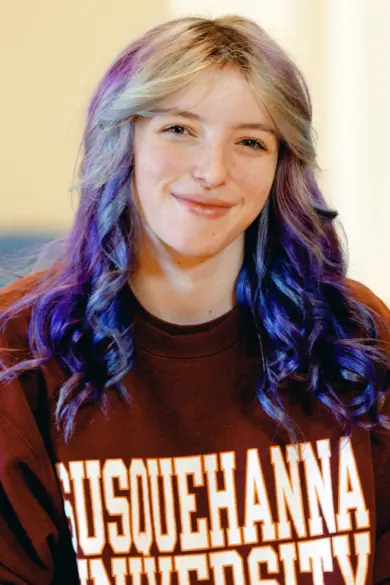
“I love Susquehanna. The community here is incredible. I love being able to walk around and wave to people I know from my major, outside my major and other classes I’ve taken.”
— Emily Chambers ’26
EMPHASIZING THE SOCIAL RELEVANCE OF THEATRE
At Susquehanna, theatre is a living, breathing discipline that extends beyond the stage.
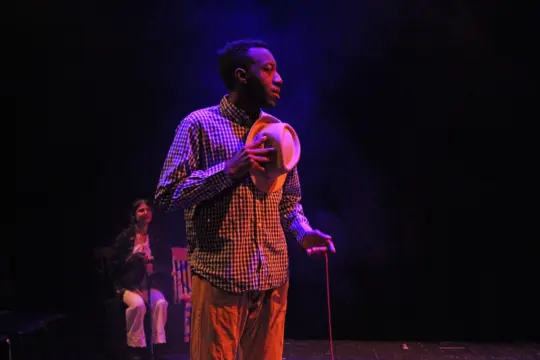
Meet the Faculty
TAKE A VIRTUAL TOUR
Launch Degenstein Campus CenterYOU MAY ALSO BE INTERESTED IN
See the full list of related programs on the School of the Arts page.
Have Questions?
Contact Us
Department Head
Erik Viker
570-372-4548
Start your journey.


